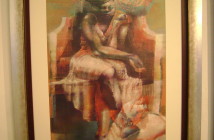October 09, 2012
Theater semiotics, one branch of the intellectual and theoretical pursuit of that art, analyzes stage elements as a chain of "signs" that signify meaning. This branch is tangled in undergrowth because some people know much more about how scholarship is done than about how theater is done, but it can be rewarding to ask a set or a costume, "What are you meant to signify?" It certainly is with The Nora Theatre Company’s production of The How and the Why, Sarah Treem’s play that is equal parts complex characters and complex evolutionary theory.
The set for the first act is a study: large desk, leather chairs, shelves of books. They are all readable signs of a character’s thoughtful work and long-established, comfortable authority. The professor whose habitat they are is Zelda Khan, played by Debra Wise, whom it is always a pleasure to watch. Her costume, when she enters, signifies that same ease; her identity and position fit her, and she wears them well. Her young visitor, Rachel Hardeman, played by the excellent Samantha Richert, presents a different appearance. Rachel, a beautiful grad student, wears gray clothes with an odd, amorphous look and a scarf that does battle with her long hair, as if she has not yet quite found what truly fits her.
Their first conversation is awkward, suggesting the social ineptitude of stereotypical scientists, but the minute the talk turns to evolutionary biology, the words flow like sparkling rivers. A strange connection, beyond their shared profession, has brought these two women together, and the road of their relationship will be strewn with mutual dependence, professional rivalry, arguments about science, and debates about what life choices fulfill women.
I will freely admit, I can’t figure out what the Pulitzer committee was thinking when it gave the Prize to Wit, a play in which a literature professor reviews her choices while being punished for them by the unstable gods that determine our lives. It’s a weak link in a long chain of cliché: the concept that a woman’s personal growth can only be expressed through heteronormative sex, childbearing, and death permeates our cultural products. The Bond girl sleeping with the villain comes back to James’s bed. A woman dies in childbirth to redeem past sins. A loveless intellectual (of course, she must be both) faces death alone. What I admire about The How and the Why is that neither woman is punished for any choice she makes or questions. The issue of passionate devotion to a career that eclipses other passion arises, as do the compromises we can make for the sake of loving another person. But Treem does not present these emotional ties as mutually exclusive, two doors containing a lady or a tiger. These issues coexist and conflict in the women’s lives, but, like the sexism, ageism, and ego-driven brutality of the academic conferences the two attend, that’s how it goes.
Zelda is reserved, precise, and observant, but she is not cold. She carries the intellectual authority she has earned without having become either a nun or a bitch. She’s in love with the work she spent her life doing, and she has regrets about choices not made, but that makes her human. And Rachel does not become inferior because she values a lover; her confusion over her multiple priorities makes her young and unfinished, like the brilliant theory she is trying to get colleagues to recognize. Although issues of gender arise in many ways, scientific and personal, there is no easy answer to the how and the why of our evolution as humans or as our individual selves. What’s great about this play is that it frees the characters from the either/or answers and from the revenge for "wrong female choices" that has so long plagued half the population of fictional characters.
The How and the Why by Sarah Treem, produced by The Nora Theatre Company, runs through November 4th at Central Square Theater in Cambridge.
Tickets/Info: 866.811.4111




